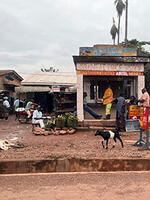Filter by...
Reset all
Publications (129)
Report
pdf
This report documents UGAMOD, the SOUTHMOD model developed for Uganda. This work was carried out by Uganda Revenue Authority (URA) and Makerere University in collaboration with the project partners. The results presented in this report are derived using UGAMOD version 2.1, which is part of the...
Blog
Uganda, with a fiscal deficit of 5.6% in 2023, has increasingly turned to local resources to make up for its revenue shortfall since the World Bank suspended its funding on 8 August 2023 over the country’s anti-homosexuality law. In early April 2024, traders in downtown Kampala protested against...
Working Paper
pdf
– Comparing the performance of universal basic income in Uganda and Zambia during COVID-19
The debate over universal basic income (UBI) has gained traction in the developing world in recent years. We analyse the effects of four UBI schemes on poverty and inequality measures during normal times and times of crisis in Uganda and Zambia. We use static microsimulation models and nationally...
Working Paper
pdf
Cross-border traders face a choice between official and unofficial border crossings. The latter allow them to evade taxes, but expose them to other risks, such as bribes, fines, and arrest. We investigate the perceptions of cross-border traders about the risks of trading officially vs unofficially...

While multinational corporations (MNCs) make up only 1.9% of firms operating in Uganda, they are overrepresented among tax holiday beneficiaries. New estimates reveal that Uganda’s revenue losses due to these tax expenditures peaked at USD 42 million in 2020.A new dataset allows for the first...
Working Paper
pdf
This paper studies the impact of the COVID-19 pandemic on formal sector employment in Uganda. Utilizing employee-level administrative tax data from the Uganda Revenue Authority, we describe the dynamics of employment as the pandemic evolved, seeking to better understand the various coping strategies...
Technical Note
pdf
This Technical Note describes Ugandan trade data covering import and export declarations for ten calendar years from January 2013 to December 2022, constructed from transactional-level Ugandan administrative data. The trade data series contains transaction-level ten datasets on imports and ten on...

– Combining tax data and Google Street View images
The issue of tax non-compliance among businesses is pervasive in many developing economies, including Uganda. But to what extent do businesses comply with their tax obligations in the capital city, Kampala? Can the local environment and geographic information help predict the risk of tax non...

Parts of Uganda that had centralised political systems before colonial rule are more likely to have higher rates of voluntary tax compliance. Merima Ali and Odd-Helge Fjeldstad look at why that might be the case.Voluntary tax compliance is an important source for domestic revenue in Africa as the...
Working Paper
pdf
– Challenges and prospects for Uganda
This paper simulates the impact of the global minimum corporate tax rate (GMCTR) in Uganda by estimating the difference between the mechanical and the behavioural changes in tax revenue. Overall, implementation of GMCTR will increase tax revenue, and the revenue increase is inversely proportional to...
Working Paper
pdf
– Evidence from Kampala, Uganda
This paper investigates business tax compliance in a multilevel tax structure with limited coordination. We study the case of Kampala, where firms are taxed at national and local levels—by the Uganda Revenue Authority and the Kampala Capital City Authority, respectively—and where the agencies...
Working Paper
pdf
Uganda has one of the lowest corporate income tax collection rates in sub-Saharan Africa, while offering generous corporate tax incentives. It is unclear whether tax incentives achieve their objectives without primarily benefiting firms, potentially undermining domestic revenue mobilization and...
Working Paper
pdf
– A comparative perspective
We examine the distributional effects of the COVID-19 pandemic and associated tax-benefit measures in seven sub-Saharan African countries, focusing on the onset of the crisis.We evaluate impacts on disposable incomes, considering variations across income groups; assess the effectiveness of tax...
Technical Note
pdf
This technical note describes the Uganda Revenue Authority (URA) Pay-As-You-Earn (PAYE) data covering financial years 2013/14 to 2021/22. PAYE is paid by an employer who withholds personal income tax on employees’ wages and other employment incomes like benefits and allowances. The data are...
Working Paper
pdf
– Evidence from Uganda
We investigate how the arrival and expansion of mobile network access in Uganda influences firm tax behaviour. Access to mobile technologies could broaden government revenues from corporate income tax through the extensive margin: by reducing the costs of formalization, it could increase the number...
Displaying 16 of 129 results
 Join the network
Join the network